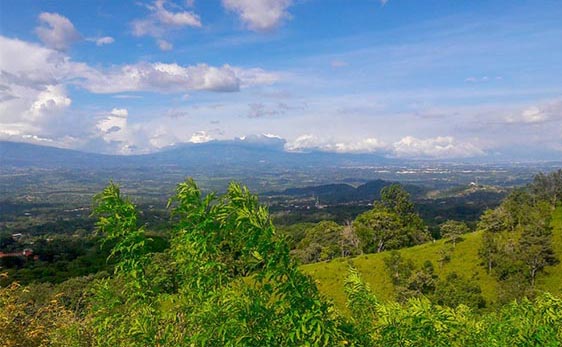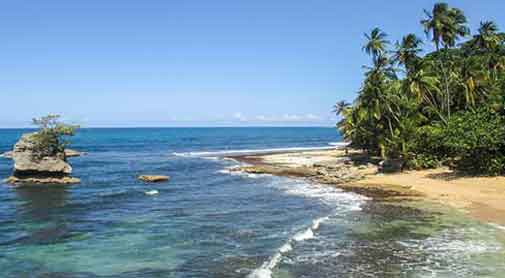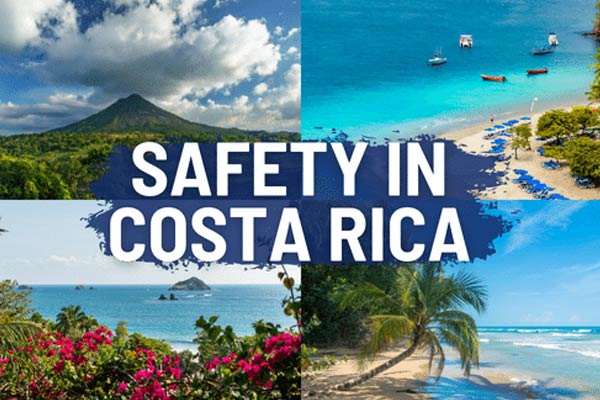The picturesque town of Atenas, Alajuela has always been a stable gem nestled in the mountains of Costa Rica’s breathtaking Central Valley. It is less than an hour west of downtown San Jose and just minutes away from the modern toll road leading into the capital or outbound to the beaches. When AARP named it one of the best places to retire abroad in 2010, the secret was out. Fortunately, though, it still retains its small-town charm.
Retire in Atenas

Known for its year-round temperate climate, both retirees and locals have found Atenas to be Costa Rica’s temperate “sweet spot.” The city has attracted more residents since the long-awaited Caldera Highway was completed. The highway, which runs from Ciudad Colón, south of Alajuela, to Puerto Caldera on the Central Pacific Coast, cuts the travel time between the Central Valley and the coast. But even before the new road, Atenas was less than two hours from many beaches.
Surrounded by mountainsides of sugar cane and coffee, the town is located on the old historic oxcart trail, which was the primary transportation route to bring coffee to the ports on the Pacific and Caribbean sides in the 1800s. Although you still see working oxcarts, the route has long been replaced with well-maintained paved roads. The trip to trendy, suburban Escazú takes approximately 30 minutes—where expats utilize the best of Costa Rica’s shopping, fine dining, and healthcare. It is also 30 minutes from the country’s main international airport (SJO), in nearby Alajuela. The closest Pacific beaches are an hour away, making its location hard to beat anywhere in the entire country. Nearly everything is located within an hour or less.
Located at a pleasant, mosquito-free altitude ranging from 2,280 to 4,000 feet and with maximum temperatures reaching the low-to-mid-80s F and minimums rarely below 65 F most homes do not require heat or air conditioning. The seasons mirror the rest of the country with the driest months being mid-November through mid-May, with varying amounts of precipitation the other months (September to October being the wettest). The weather, altitude, and volcanic soil make it a perfect coffee growing environment.
Atenas has a strong expat community (estimated 2,500 full or part-time) of mostly retired foreigners, but you will also see some younger families moving into the area. With an uptick of younger families moving to Atenas, there is a larger need for schools. You will find public elementary schools and high schools in Atenas, as well as several private bilingual Spanish-English schools: Green Valley School (pre-school, elementary, and high school) San Rafael Bilingual High School, and Colina Azul School (pre-school & elementary.)
Lifestyle in Atenas

The staples you need for day-to-day life can be found in Atenas. From supermarkets to pharmacies and restaurants to gyms and the Feria del Agricultor de Atenas or farmers market—where you can buy farm-to-market fresh produce, meats, and other sundries and socialize with your neighbors. One of the reasons expats enjoy Atenas so much is there is no shortage of activities. Such as taking classes for water aerobics, Thai chi, and guided meditation, as well as enjoying live music with a local expat bluegrass band or dinner with friends at the popular pizza parlor downtown to a quiet afternoon of bird watching. You won’t find a late-night party crowd here, but that is exactly the way residents want it.
Because of Atenas’ close proximity to west suburban San Jose, all medical needs are typically treated there. One of Costa Rica’s three JCI-certified private, full-service medical centers—Hospital CIMA—is located just 30-minutes away in Escazú. In this area you will also find most of your regularly visited wellness doctors.
If you are using the Caja national healthcare system, Hospital Mexico has a very good reputation and is also located in the western side of San Jose in La Uruca.
In downtown Atenas, you will also find a local branch of the Red Cross for minor emergencies. They also provide ambulance service. There is a private minor emergency facility and a local public CCSS (Caja) clinic to administer basic medical treatments. There is also over one-half dozen dentists in the city of Atenas.
Atenas has a car culture and most expats own one, since the town and nearby developments are fairly spread out. Luckily, there are dozens of new car dealers less than an hour away near San Jose, plus just 30 minutes away you will find the used car capital of Costa Rica: Grecia. Surprising to many, the town boasts 63 used car dealers within a few miles’ radius.
If you decide not to own a car, there are a number of different bus lines which service Atenas in the city and to various locations around the country. Because there are several different companies and not a central booking website for all, it can initially be a bit confusing. But once you figure out your routes, you will ride like a pro. Buses are safe and fairly efficient. Seniors with their residency and a Ciudadano de Oro (gold citizen) card ride the bus for free if the trip is less than 15 miles in distance.
Is it Safe to Live in Atenas?

Costa Rica has never been a country known for high violent crime rates or homicides. The general population is “tranquilo”, embracing the pura vida lifestyle on many levels. Also, the gun laws are strict and gun ownership is minimal. In fact, foreigners cannot legally own guns until they have acquired permanent residency status, which takes four years or longer. There is petty theft, especially in tourist areas. Fortunately, Atenas is not high on the tourist route—as vacationers typically opt to go to the country’s beautiful beaches or enjoy adventure sports in the mountains of Arenal or Monteverde. Therefore, crime here is minimal.
Since Atenas has that small-town charm, you will find neighbors look out for neighbors and take care of one another. Most developments are gated and have a guard at the entrance. This does not mean it is a dangerous neighborhood, it is just the way communities are set up in Costa Rica.
It is safe to walk around after dark, but as always, it is recommended to avoid being alone or in dark areas. Like everywhere in the world, it is best not to wear expensive jewelry or flash large amounts of cash. And never leave anything of value within view inside your parked car.
Cost of Living in Atenas

Atenas has a wide range of different types of housing available. Each place is unique in that you won’t find “cookie-cutter” type developments. A two-bedroom, two-bathroom home or apartment with North American amenities typically runs from $750 a month for unfurnished to $1,100 a month for furnished. But if you are working with a limited budget, it is not unheard of to find a rental for as low as $450 a month. These will be smaller, basic homes lacking in space for full-sized appliances and will not have hot water heaters except for the tricky shower head heaters. If you are in the market for luxury, you can find lavish homes in the mountains upwards of $3,500 a month.
The area has experienced some housing booms due to its popularity over the last decade. If you are in the market to buy, there are very few two-bedroom homes since most owners anticipate visitors and require an office. Therefore, most homes will have three-bedrooms. You can find smaller homes for sale for around $200,000. Although most of the market demand is for more spacious homes with pools and views which fall into the price range of $350,000 and up.
Since Atenas is a farming town and consumable goods are priced for residents, not tourists, prices for daily living are lower than what you find at the beach communities. Produce is much cheaper than in the U.S. and meat costs about the same. At the feria, shoppers can find deals like three pineapples for $2 or a huge bunch of bananas for $1.
For a sit-down meal, you can hardly beat the prices at a soda (a small family-owned restaurant). The price for a casado, a typical Costa Rican meal of a protein, rice, and beans, along with a beer will cost about $8 to $10. A meal at a larger restaurant will be more in line with prices in the U.S. For example, a meal for two with a glass of wine can run $40 or more.
Household help is affordable in Atenas as well. Cleaning staff or gardeners for your property will run you from $3 to $4 an hour.
A typical monthly budget for a couple runs between $2,000 and $3,000, the largest factor being if you rent or own your home, use private or public healthcare, and own a car. Here’s an example of a monthly budget for a couple living in Atenas with a car and renting a two-bedroom, two-bathroom home, and using the Caja public healthcare system:
| Expense | U.S. $ |
| Rent for a two-bedroom apartment | $1000 |
| Utilities (electric, water, gas, cable, internet, phones) | $150 |
| Groceries | $400 |
| Medical/Insurance $200 | $200 |
| Dining/Entertainment $300 | $300 |
| Transportation | $150 |
| Household Help | $60 |
| Incidentals | $100 |
| Total | $2,360 |
[costa_rica_signup]
Things to do in Atenas, Costa Rica
By Kathleen Evans

Although this small gem is peaceful and tends to roll up the proverbial red carpet fairly early, you can also find plenty of things do to in and around town, whether here for a short visit or for a lifetime.
Here are my top picks for things to do in Atenas:
1. Relax in Central Park

Like all Costa Rican towns, the heartbeat in the center of Atenas is the park. Central Park in measures a square city block and it is the perfect place to relax on a bench under the shade of towering indigenous Costa Rican trees. There is a playscape for the kids and a central pavilion, home to live music and events. Several restaurants and shops border it so you will find all kinds of activity nearby.
2. Find Peace at San Rafael Arcángel Church

Adjacent to the park you will find San Rafael, the main Catholic church in town. Opened in 1908, the surprisingly large church is very well preserved and boasts a gorgeous natural wood ceiling made by local craftsman. Even if you are not Catholic, it is a nice place to enjoy some quiet contemplation.
3. See Wildlife Up-Close at Zoo Ave

Around 10 miles northeast of Atenas you can get up close to as many as 250 species of the spectacular wildlife Costa Rica has to offer. Founded as a wildlife reserve, the mission of Zoo Ave is to rehabilitate animals and reintroduce them back into the wild. They are located on 50 lush acres and strolling around you have the chance to spot macaws, toucans, ostriches, and peacocks.
4. Wake up on a Coffee Plantation Tour

One of the glorious things you notice driving into Atenas are the coffee plantations dotting the mountainsides. Costa Rica is renowned for growing some of the most delicious coffee beans in the world. Fortunately, for Atenas, they have the perfect annual temperatures, nutrient abundant soil, and prime elevations that would even make Juan Valdez envious. There are a number of tours in the area offering hands-on experiences of the coffee making process, start to finish including CoopeAtenas R.L. and El Toledo.
5. Cool off at Las Minas Waterfalls

In the remote town of Desmonte, about a 22-minute drive west of Atenas on Highway 3, you will find one of the many hidden treasures in the Central Valley. Las Minas (or the Mines) was named so after an abandoned gold mine upriver. Although the series of falls are comparatively small to some of the others in the country, the large swimming hole at the bottom is a perfect place for a cool off. It has a gentle slope in, but is deep enough in the center not to be able to touch the bottom. It is so far off the beaten path that you may have it all to yourself. Be sure to get good directions and wear your water shoes for the short hike uphill from the parking lot.
6. Stroll Through the Botanical Orchid Garden

In the district of La Garita, just six miles east outside of town, you can delight in learning the art of orchid cultivation. Costa Rica is famous for its staggering 1,400 species of orchids with 20% of them being endemic, so they don’t grow anywhere else on the planet. This botanical garden features winding trails through a permanent floral exhibition.
7. Buy Organic Produce at the Weekly Feria

Every community in the country hosts a feria(or farmer’s market) on a weekly basis. Atenas is famous for their Friday market from 6 a.m. to 8 p.m. It is not just a place to buy farm-to-market fresh fruits, vegetable, flowers, meats, and sundries—it is a social event for locals, expats, and visitors alike. A place where you can meet up with friends and get the local gossip, and stock up on healthier food, typically cheaper than the grocery store.
8. Never Stop Learning or Stay Fit—Take a Class

The expat community is close-knit and active. If you are visiting for a while or scouting to possibly move here, you will be surprised at the multitude of classes available. From guided meditation, to art, and Thai Chi to water aerobics. Pop into any of the local popular expat restaurants, such as Pizzeria La Finca or Pequeña Polonia (Formerly Kay’s), and ask around for the next class schedule. You are likely to find something to fit your desires.
You’ll Enjoy a Great Climate Living in Atenas, Costa Rica
It averages in the mid-70s year-round. A few days might skew warmer and the evenings might dip into the 60s—just enough for a light jacket. But mostly it’s perfect. In the rainy season, late afternoons are wet, sometimes very. But mornings are clear.
Of course, if you need further confirmation, just see the motto on the back of the town’s buses: “El Mejor Clima del Mundo”: the best climate in the world.
Expats here tend to make their homes in the hills surrounding the town. The views of the surrounding coffee and sugarcane plantations, as well as forested valleys, are amazing. There are a wide variety of housing options.
A three-bedroom home with a mountain view can be had for under $150,000. There are higher-end options; several gated communities have homes running from $200,000 and up.
[costa_rica_signup]
A Slow-Paced Life in the Town That Boasts “The Best Climate in the World”
By Shannon Farley
My favorite day of the week is Friday in my country town of Atenas—although since moving to Costa Rica, every day is pretty good. On Fridays, I pile all of my five dogs into the car and head early in the morning for the farmers’ market, followed by a lively off-leash hike on a forested mountain trail near town. Since temperatures rarely dip below the 70s F, we can get out and about at any time of year.
Healthy living is easy in Costa Rica and is one of the things I love most about living here. My husband and I grow a lot of fruit trees and some vegetables and herbs. We give away a lot when we have a surplus, but I still go to the farmers’ market weekly to get what we don’t have.
 Called a feria, this market is the place to buy fresh fruit, vegetables, flowers, baked goods, dairy products and meats, plants and herbs, as well as organic coffee grown locally in Atenas. Whenever I visit my hometown in Southern California, I am always shocked at how expensive fresh produce is, especially organic products. Here in Atenas, for about $30 I can fill my refrigerator with fresh vegetables and fruits (mostly organic), plus a couple of packets of invigoratingly strong Atenas coffee. If I splurge $6, I can buy homemade Italian sausage or four homemade stuffed tamales and two creamy arroz con leche (rice pudding) cups. These will make my Costa Rican husband happy, since in my nearly 17 years of living here, I’ve not yet learned to make these culinary favorites.
Called a feria, this market is the place to buy fresh fruit, vegetables, flowers, baked goods, dairy products and meats, plants and herbs, as well as organic coffee grown locally in Atenas. Whenever I visit my hometown in Southern California, I am always shocked at how expensive fresh produce is, especially organic products. Here in Atenas, for about $30 I can fill my refrigerator with fresh vegetables and fruits (mostly organic), plus a couple of packets of invigoratingly strong Atenas coffee. If I splurge $6, I can buy homemade Italian sausage or four homemade stuffed tamales and two creamy arroz con leche (rice pudding) cups. These will make my Costa Rican husband happy, since in my nearly 17 years of living here, I’ve not yet learned to make these culinary favorites.
The farmers’ market always turns into a social event. While my dogs wait in the shaded car, I chat with my favorite vendors and with any of Atenas’ many expats who happen to be at the feria as early as I am.
The active expat community is just one of the things that makes Atenas, a town of around 27,000 people west of the capital, San José, a great place to live. My husband and I moved to Atenas six years ago from the Central Pacific coast. What most attracted us then was the convenient location between the city and the beach; a cool climate that is more pleasant than on the coast; affordability; and the feeling of safety you get in a small town. On top of all that, the local Atenienses are kind, warm, and welcoming. They greet you when you walk down the street and wave to you when you’re driving. Shopkeepers are always polite and friendly, and I often chat with them about the weather, local or national politics, or how the regional football team is playing before I get around to buying something.
People are happy here. They laugh and enjoy life, and family time is very important. It’s quite a change from the hectic, rapid-fire pace of life my friends and family live back in Southern California. Nowhere is this more evident than in Atenas’ central park, which is lined with tall palm trees that draw flocks of green parrots or toucans. Here you can find children playing on the recently built playground, older people enjoying a rest and a chat on park benches, young people strolling along the pathways, and families out for a paseo (walk). The Catholic church borders one side and the rest is ringed by the Atenas municipal building, the national bank, shops, restaurants, and ice cream cafés. It is the perfect spot to enjoy an ice cream or coffee or simply take in local life. It’s all just part of the rhythm of life in this town I’ve grown to love.
Nestled amid coffee plantations in Costa Rica’s Central Valley, Atenas rests at the edge of the central mountain range, where it drops away to the west toward the Pacific coast. Everywhere your eye falls on is beautiful, from green coffee- and forest-covered mountains to splendid valley views and picture-perfect coastal vistas. As well as coffee plantations, the town is surrounded by cattle ranches and sugarcane fields.
This peaceful, rural area has a growing expat community. Atenas’ location, great weather, and small-town ambience have made it a wonderful place to retire and live internationally. Around 1,500 foreign residents from all over the world live here full-time, about three-quarters of them retirees. That number almost doubles during Costa Rica’s high tourism season, from December to early April, when part-time residents and tourists arrive to enjoy vacation homes in Atenas.

The town is well located, as it’s just under an hour’s drive from San José, with its world-class healthcare and other big-city amenities, and an hour to gold- and black-sand Pacific beaches in the other direction. It takes only 30 minutes to reach San José’s international airport or the nearest large shopping malls in Alajuela (Costa Rica’s second-largest city) or Escazú (a well-to-do suburb of San José).
The town likes to boast that it has the world’s best climate. Even in the rainy season, from June to November, most mornings are sunny. Since the town’s rugged terrain of mountains and valleys ranges in elevation from 2,200 to 4,000 feet, weather can be cooler or hotter, depending on where you live. Either way, you still save money, as there’s no need for air conditioning or heating.
While the cost of living has risen during the time I’ve been in Costa Rica, it’s still affordable compared to Southern California. My husband and I average $2,500 in monthly expenses. We own our home and our one car, have a housekeeper who comes once a week, and go out to eat once or twice a week. Groceries, pet supplies, and household items run $600 to $700 a month, shopping at the farmers’ market and our modern CoopeAtenas supermarket in town.
If you can afford it, it’s better to buy your own house. That way you don’t have to worry about leases, landlords, or rent increases over the long term. You can always rent it out as a vacation rental if you’re not ready to live in Costa Rica full-time. Renters are mostly from the U.S. and Canada who come during the northern winter months from December to Easter to escape the cold weather. Between May and August, tourists who want to see Costa Rica’s Central Valley and Central Pacific coast also look for vacation rentals here.
Healthcare in Atenas also is very affordable. We have a well-equipped public health clinic, pharmacy, lab, and emergency room in the town center, next to the Costa Rica Red Cross, which provides emergency paramedic and ambulance service. If you are a member of the national public health insurance system, known as the Caja, treatment is free. Many expats in Atenas opt to use the private health clinic, Línea Vital Costa Rica, which has three ambulances.
Caja membership is 6% to 11% of your reported monthly income, with a dependent spouse included. Most expats pay between $60 to $100 a month for full coverage. Several bilingual Caja physicians also offer private consultations, usually charging less than $20 a visit. Excellent, internationally rated private hospitals and national public hospitals are only 30 to 60 minutes away in Escazú, San José, and Alajuela.
There are plenty of clubs and community groups to keep expats in Atenas busy. There is a men’s group, a book club, a Buddhist meditation group, a women’s club, and an artists’ group. I enjoy attending yoga classes at the Atenas Yoga Center and occasionally go out to hear the expat rock bands that play live music around town. I take language lessons in Italian and advanced Spanish at the Su Espacio Cultural Center (it also offers English language lessons). We also have a monthly English-language online newspaper called Atenas Today, for which I am a columnist. I help out volunteering at our local animal foundation, Animales Atenas, and many people volunteer at the Atenas nursing home and children’s orphanage.
A popular expat hangout in Atenas for the past 10 years is Kay’s Gringo Postres, famed for its Sunday brunch. For $12, you can feast on a sumptuous breakfast buffet of smoked ham, sausages, bacon, scrambled eggs, gallo pinto (beans and rice), breakfast potatoes with onions and peppers, biscuits and gravy, fresh fruit, coffee, tea, and orange juice.
There are worse ways to start your Sunday morning.
[kathleen-evans-bio]
[costa-rica-website-affinity]




